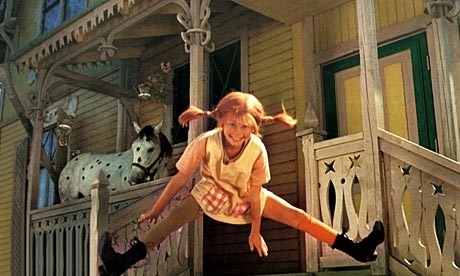by Vivian Obarski
When I grow up, I want to be Pippi Longstocking. I don’t know if I can pull off the fire-red braids that stick straight out, or live in a ramshackle house with a horse on the porch and a pet monkey. Actually, I can’t. My family has told me we’re not allowed to have a horse because they’re too big and won’t be happy in our small backyard. When I was pregnant, my husband vetoed the idea that we name our daughter Pippilotta — admittedly it was partially in jest. Partially.
But I still want to be Pippi Longstocking. I think I’ve always wanted to be her ever since I read the series of books by Astrid Lindgrin. As a child, I loved her boisterous personality — ignoring manners, telling outrageous stories, being as strong as an ox and living alone with her monkey, Mr. Nilsson, and her horse. She’s clever, tricking greedy and unimaginative adults, but not book smart because refuses to go to school.
The stories are fanciful — basically wish fulfillment for kids in some way. Only Pippi (who didn’t have any parents around to tell her to go to school, clean her room or eat her vegetables) could go shopping with a bag of gold coins and buy nothing but candy and toys. There was no way I could do that as a kid with my meager allowance. Nor could I travel to the South Pacific and go swimming for pearls like Pippi and her friends, Tommy and Annika.
But that’s common for children’s literature — some of the most loved classics are about children going on adventures without adult supervision. And at times people outgrow those books, but I haven’t. I still love reading the chapters and her adventures and as I’ve gotten older, I’ve gleaned other lessons from the books.
Growing up as the “weirdo” in school, there’s two ways you can go — you either conform and try and fit in, or you can let your freak flag fly and do your thing. Looking back, Pippi’s stories made me embrace my weirdo and just keep being myself, because really, conforming just seemed like more work than it was worth. The lesson of just being yourself is something that will always stick with me.
I’ve also found the books as a good reminder that generosity, kindness and goodness are not associated with how respectable and well-mannered you are. Let’s be honest, Pippi’s manners are horrific, even when she’s trying. She’s brutally honest, but paradoxically prone to outrageous lies and stories. But she’s generous to a fault. She buys toys and candy for all the children in town during her shopping spree, she uses her strength to rescue people from danger time and time again without a second thought.
She’s also a merciful character. While she will toy with thieves to come to her house to steal her suitcase full of gold coins and scare them with her almost superhero strength, she will also give them said loot for dancing and playing with her. She’s made massive feasts for Tommy and Annika for their various adventures and even given them presents and creates fantastic stories for their entertainment. Pippi is never a violent girl, despite her strength and power — her feats of strength are usually in relation to defending or helping other people. How can you not like a character like her?
Years ago, I found the Complete Adventures of Pippi Longstocking for sale in a gift shop and bought it for myself. I wasn’t a parent at the time (it would be years before I became a mother) and I devoured the book. It was as good as I remember — maybe a bit better, because I found myself identifying with both Pippi and the exasperated adults she dealt with (as an adult, I could see both perspectives clearly). It was like a Harold Ramis movie. There were moments where Pippi gleefully thumbed her nose at social convention, but her goodness is never really in doubt, even though she’ll drink a pitcher of coffee and juice at the same time after eating a dozen cookies during an elegant kaffeeklatsch.



*LindgrEn
As a Swede who grew up in the seventies, I can’t stand Astrid Lindgren. Saying out loud that you don’t like Astrid Lindgren is tantamount to treason, and all of her books are required reading, so to a Swedish non-conformist, Pippi is basically Ronald McDonald with bad manners.
My mother who grew up in the forties and fifties loved Pippi for the same reasons you do, so I do understand your point. To a child growing up in a strict working-class household, having complete freedom and unlimited funds must seem wonderful.
The recent editions of the books have been changed slightly, as her father was originally “king of the negroes” and ruled over “a bunch of negroes” on his island. (They now use the nonsense word “Kurrekurredutt” instead.) Keeping that in mind, Pippi’s bag of gold coins may be pretty ill-gotten.
Suprisingly, her father has a real historical counterpart. http://en.wikipedia.org/wiki/Carl_Emil_Pettersson
It’s a shame Hayao Miyazaki didn’t get the rights to an animated Pippi. Instead he made the superior ‘Panda Kopanda’ which is clearly inspired by Pippi, but also feature two pandas. Pippi has zero pandas. That’s Miyazaki 2, Lindgren 0.